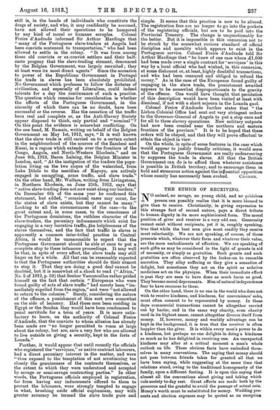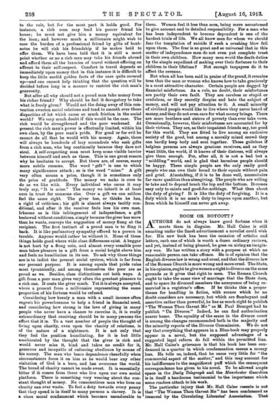THE ETHICS OF RECEIVING.
NO animal, no savage, no young child, and no prideless person can possibly realize that it is more blessed to give than to receive. Christianity, in giving expression to this strange fact of second nature, pays a direct tribute to human dignity in its more sophisticated form. The moral position of giver and receiver is a very odd one. Generosity cannot exist without recipients, yet it is, roughly speaking, true that while the best men give most readily they receive most reluctantly. We are not speaking, of course, of those presents which, whatever their form and whatever their value, are the mere embodiments of affection. We are speaking of such gifts as may be considered in the light of grants in aid of necessity, or simply as gratuities. Such grants and such gratuities are often observed by the looker-on to resemble narcotics. They allay suffering or they give a sensation of delight, but sometimes they act on the spirit as sedative medicines act on the physique. When their immediate effect is past they are seen to have done as much harm as good. They become moral depressants. Men of natural independence fear to have recourse to them.
On the other hand, there is no one in the world who does not wish to receive kindness, and kindness, for convenience' sake, must often consent to be represented by money. In these days commercial transactions cannot be altogether carried out by barter, and in the same way charity, even charity used in its highest sense, cannot altogether divorce itself from money. If, however, money and worldly advantage can be kept in the background, it is true that the receiver is often happier than the giver. It is within every man's power to do a kindness, but perhaps no one delights in doing a kindness as much as he has delighted in receiving one. An unexpected kindness may alter at a critical moment a man's whole outlook on life. These obvious facts have embodied them- selves in many conventions. The saying that money should not pass between friends takes for granted all that we have been saying, while suggesting at the same time that relations stand, owing to the traditional homogeneity of the family, upon a different footing. It is upon this saying that almost all the conventions about giving and taking which rule society to-day rest. Great efforts are made both by the generous and the grateful to avoid the passage of actual coin. Money's worth must be substituted for money. Wedding pre- sents and election expenses may be quoted as an exception to the rule, but for the most part it holds good. For instance, a rich man may lend his poorer friend his Louse ; be must not give him a money equivalent for the loan; and however much a millionaire might wish to ease the burden of a professional friend by gifts of bank- notes he will risk his friendship if be makes bold to offer them. We have been told that it is still a moot point whether or no a rich man may take his friends abroad and afford them all the luxuries of travel without offering an affront to their self-respect. Comfort in travel depends so immediately upon money that in this instance it is difficult to keep the little sordid golden facts of the case quite covered up—and one cannot help thinking that the question will be decided before long in a manner to restrict the rich man's generosity.
But after all why should not a proud man take money from his richer friend ? Why should he feel it derogatory to take what is freely given ? Would not the doing away of this con- vention sweeten social relations and tend to smooth over those disparities of lot which cause so much friction in the social world ? We very much doubt if this would be the case. The rich would be strengthened and the poor weakened. At present the rich man's power is effectually limited, within his own class, by the poor man's pride. For good or for evil he cannot do all that he would with his money. Again, there will always be hundreds of lazy scoundrels who seek gifts from a rich man, who beg continually because they dare not steal. A self-respecting man must keep some visible barrier between himself and such as these. This is one great reason why he hesitates to accept. But there are, of course, many more subtle reasons. The word " gift " is one to which many significances attach ; so is the word " mine." A gift very often means a price, though it is sometimes only the price of gratitude. The money we make is ours to do as we like with. Every individual who earns it may truly say, " It is mine." The money we inherit is at least ours in trust for someone else. Over a gift we can seldom feel the same right. The giver has, or thinks he has, a right of criticism ; his gift is almost always tacitly con- ditional, and after it the receiver feels less his own man. Irksome as is this infringement of independence, a gift bestowed without conditions, simply because the giver has more than he wants, conveys the suggestion of money flung at the recipient. The first instinct of a proud man is to fling it back. It is like perfunctory sympathy offered to a person in trouble. Anyone would rather be without it. None of these things holds good where wide class differences exist. A beggar is not hurt by a flung coin, and almost every sensible poor man takes pleasure in a gift from a social height above him and feels no humiliation in its use. To ask why these things are is to indict the present social system, which is far from our present purpose. It is among equals that pride rules most tyrannically, and among themselves the poor are as proud as we. Besides, class distinctions cut both ways. A gift from a poor man gives very often the greatest pleasure to a rich one. It costs the giver much. Yet it is always accepted, where a present from a millionaire representing the same proportion of his fortune would be refused.
Considering how keenly a man with a small income often regrets his powerlessness to help a friend in financial need, and considering how strong is the love of giving in many people who never have a chance to exercise it, it is really extraordinary that receiving should be to many persons the effort that it is. To a vast number of people the thought of living upon charity, even upon the charity of relations, is of the nature of a nightmare. It is not only that they feel the position humiliating, for it is but little ameliorated by the thought that the giver is rich and would never miss it, kind and takes no credit for it, generous and incapable of enforcing obedience by means of his money. The man who bears dependence cheerfully when circumstances force it on him as he would bear any other visitation of God is a hero, and has overcome the world. The bread of charity cannot be made sweet. It is essentially bitter if it comes from those who live upon our own social platform. There is something very wearing about the con- stant thought of money. No conscientious man who lives on charity can ever waste, To feel a duty towards every penny that they spend is in itself to many persons a slavery. It is a close moral confinement which becomes unendurable to
I them. Women feel it less than men, being more accustomed to give account and to detailed responsibility. For a man who has been independent to become dependent is one cf the hardest trials of life. We all know men for whom we should fear the temptation of suicide if such a crushing blow fell upon them. The fear is so great and so universal that in this matter of independence men do not even put complete trust in their own children. How many men avoid the death duties by the simple expedient of making over their fortunes to their children in their lifetime ? Not enough taxpayers do it to affect the revenue.
But when all has been said in praise of the proud, it remains true that the man or woman who knows how to take graciously is a most attractive character. Certain people are dogged by financial misfortune. As a rule, no doubt, their misfortunes are partly their own fault. They are careless or stupid or credulous, or they secretly despise and hate the subject of money, and will not pay attention to it. A small minority of civilized people would like to live where they never heard of money, and they do not even care for what money brings. There are more brothers and sisters of poverty than ever take vows. Occasionally, however, their misfortunes are accounted for by their virtues. They are, as their impatient friends say, too good for this world. They are fitted to live among an exclusive society of the good, but among a morally mixed crowd they can hardly keep body and soul together. These guileless if helpless persons are always gracious receivers, and as they want little, the world, if it knows of their distress, will always give them enough. For, after all, it is not a bad but a " middling " world, and is glad that harmless people should be happy. These simple people are the only really good people who can owe their bread to their equals without pain and grief. Almstaking, if it is to be done well, necessitates far rarer qualities than almsgiving. The people who are willing to take and to depend touch the top and the bottom. It comes easy only to saints and good-for-nothings. What then about the duty of giving ? It is like the duty of forgiving. It is a duty which it is no man's duty to impose upon another, but from which he himself can never get away.



































 Previous page
Previous page